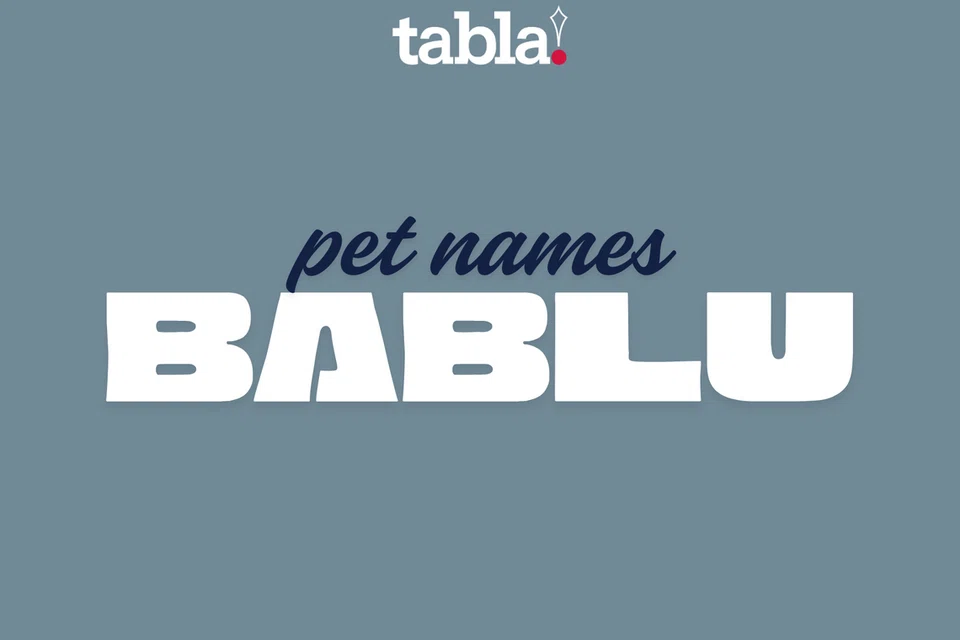I was at the Coffee Bean in East Coast Park with an American friend when the Indian woman at the next table got up and, looking in every direction, started shouting “Chikoo, Chikoo” with rising panic and volume.
Almost instinctively, we too started looking here and there. “Hope she finds her dog soon,” said my friend.
He didn’t believe me when I said the woman was missing a child, not a pet, until he saw a little boy running towards her. The man was obviously amused but, being an American steeped in political correctness, converted his involuntary guffaw into a cough.
I wish my schoolmates had displayed his sensitivity. Those who discovered, despite my best efforts, that my parents had bestowed “Bablu” on me as an affectionate family name laughed merrily, commented snidely, and leg-pulled mercilessly.
Luckily only a few did, and through a combination of begging, bribery, and blackmail (of a reciprocal nature), I was able to keep them from spreading the virus.
In such a manner, I graduated into adulthood, avoiding the ignominy of being addressed by a moniker even a pet dog might object to. With each passing year, I felt safer. But a few months ago, my tranquillity was shattered.
Someone in my tennis group posted this message: “Did you guys know Paddy’s name is actually Bablu?”
Now, while some WhatsApp messages get missed because someone else posts something more interesting that gets latched onto with enthusiasm, that didn’t happen here. Apparently, the group found this message interesting enough. I was drowned in a deluge of humour.
It took two days and India’s brilliant cricket World Cup victory to put a stop to it.
But, while the ribbing on WhatsApp has ceased, my friends all have mouths. I dread my next tennis game.
I am no outlier. Such affectionate names are as common and widespread as honking cars and exotic dialects. Some, like Bablu and Golu, show no regional bias.
Others are peculiar to the region: For example, in the north, parents lovingly christen their children Sweety or Bintu while parents in the south favour Kutty and Kunju.
All the names are embarrassing, but the regional ones can be preposterous, following children like a mortifying shadow into adolescence and adulthood.
“Nunu”, for instance, may sound cute to South Indians, but its crass connotation in Hindi dooms the child to blistering mockery everywhere north of the Narmada.
So here’s my advice to young Indian couples on the threshold of parenthood: Eschew the cute pet name. Calling your child Khuku or Subbudu may sound endearing when they’re playing on your lap, but it will sound decidedly less so 50 years later when they are negotiating a corporate buyout with a business head, finalising project deadlines with their team, or conversing with a traffic controller before landing an aeroplane.
Why am I restricting my advice to Indian couples, you ask? Because only they need it. While nicknames are not peculiar to India, the embarrassment they cause is.
Parents in Latin America add affectionate suffixes such as “ito” and “ita” to their children’s names. Juan becomes Juanito and María, Maríita.
In European cultures, Maria is called Marshenka and Alexander, Sacha. Koreans use terms such as “Agi” and “Ddoli”, and Thais use ones like “Ball” and “Golf”.
The Anglosphere follow a peculiar system of mandatory nicknames that brook no dissent: Christopher is called Chris; Katherine, Kate; and Elizabeth, Liz. But when you start to deduce that the rule is to use a syllable within the name, you learn that William is Bill, not Will.
In some cases, nicknames can be longer than the original: Wayne can become Wazza, and John, Jonno. And, for unfathomable reasons, Henry is Hank, not Hen; and Margeret, Peggy, not Mar (or Ger or Ret).
The parents may want to call Christopher Chuckoo and Elizabeth Dimbu but they have no choice in the matter. Social etiquette comes to the aid of Chris and Liz.
While their format and form vary in nicknames, none of them is embarrassing to the person carrying it. In fact the tennis sensation Carlos Alcaraz prefers to be called Carlitos.
In football, even hardcore fans may not know Ronaldo de Assis Moreira: the legendary Brazilian is known by his nickname, Ronaldinho (little Ronaldo).
I’m thinking the problem can be traced to etymology. While every other culture believes the “pet” in their child’s pet name traces its origin to the term for someone cherished, the Indians deduce it more literally and name the child as they would a beloved puppy.
(Paddy Rangappa, an ex-CEO, now teaches humour for leaders; happiness at work; and marketing through consumer insights.)



